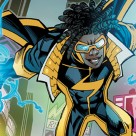The Black Panel at Comic-Con: ‘African American culture is American culture’
Posted by David on Mar 28, 2015 in Video | Comments Off on The Black Panel at Comic-Con: ‘African American culture is American culture’

This article originally ran on July 28th 2014 in The Guardian, written by Emma-Lee Moss.
Of the hundreds of panels available at Comic-Con, which drew to a close on Sunday, none are more respected than the long-running Black Panel, hosted by the comic book creator and Milestone Media co-founder Michael Davis. Unlike most of the other panels at Comic-Con, the Black Panel has nothing to sell, and features guests who also have nothing to promote. Instead, it is a discussion between audience and panel members about black culture, a way for prominent figures in African American entertainment to reach out to those who hope to emulate their paths to success.
Davis started the panel in 1998, five years after he founded Milestone, a comic book entertainment company responsible for some of the most successful black superheroes of the 90s, like Icon, a 300-year-old alien whose first earthly encounter was with a slave woman in the American south, and Static, about a high school teenager who receives superpowers after being mistakenly caught up in a gang war.
Today, the Black Panel is an institution. It is given a 90-minute slot at Comic-Con, a rare honour for any panel, and the panel alum have included RZA, Shaquille O’Neal and Nichelle Nichols, aka Lieutenant Uhura of Star Trek. This year, the Black Panel played host to Ne-Yo, J August Richards, Kevin Grevioux, Cree Summer, Erika Alexander, Tatiana El Khouri and Orlando Jones.
“When I first started the panel,” says Davis, during an interview that took 40 minutes to get to because he kept being mobbed by passersby, “There was a panel here at Comic-Con called Blacks in Comics, and that was a bitch fest, people saying ‘Oh, Marvel won’t hire me …’ So I created the Black Panel, which is positive. We ask, ‘How do we create our own heroes?’”
The Black Panel sometimes chooses a theme, says Davis, “You have to understand that the the audience is made up of all sorts of people. It’s called the Black Panel but it’s a diverse group of people. We agreed that we can’t wait for Marvel and DC to make characters that look like us, that feature women in more than supporting roles, and African American men as something other than thugs. This year, we discussed diversity, but the recurring theme is how can we create stories and characters that look like ourselves? It should be easy: you sit down and create it. But then how do we get people to look at it?”
Davis is known through many channels besides Milestone. He’s one of those people who seems able to be in many places at the same. He once headed up Magic Johnson’s entertainment company. He once lent his Tribeca apartment for the pottery scene in the film Ghost. While we are walking to the Comic-Con press room, he receives a text from his old assistant, who now works at Disney, who has left him a gift of a $1,000 rare comic in the Comic-Con HQ. He fears no one, he tells me, joking that the worse thing that could happen is a studio refusing to pay him (“I’m like, ‘You don’t pay me anyway!’”), and his goal is singular.
“I want to reach young people of colour, and let them know they can do what I do. I don’t play basketball and I’m not a rapper, though I can sing karaoke. There’s 16-year-old kids out there who love comics who have no idea how to get into the field. I want to let them know that this is possible. I want to tell them to know these people on the Black Panel, stay in touch with these people.”
And it works. This year, an audience member mentioned a comic book idea featuring an African American woman as its star. “Orlando Jones said: ‘Send it to me, I’ll put it on my networks.’ That’s not a small thing, he’s got 100,000 followers on Twitter.” Davis’ mentoring programme, Badboy Studios Mentoring Program, also has a history of success, helping to launch the careers of people like N Steven Harris, an Eisner-nominated writer for Watson & Holmes, and Aaron McGruder, the creator of Adult Swim’s wildly popular animation The Boondocks.
Davis was the first person to tell McGruder not to draw, but to focus on sharing his voice as a writer, and McGruder, who is now enjoying the beginning of stratospheric fame as Adult Swim prepares to launch his new show Black Jesus, tells this story during interviews. “One of best moments of my professional life,” says Davis, “Was walking into a panel that Aaron was speaking at, and he happened to be telling this story of how I steered him towards this voice.” He tells me this story and appears to tear up, but keeps it together by adding, “Do you know how much ass I got that night?”
The Black Panel will next make an appearance in August in Tokyo (“at a hotel I can’t pronounce the name of”). Right now, Davis is considering future guests. “One day I’m going to do a black panel with nobody on the panel except white people who have huge influence on African American culture, like Rick Rubin, Quentin Tarantino, Bill Clinton, who was in my mind the first black president. People who appreciate and respect black culture.”
“To me the Black Panel is not just about black people. It’s about black culture. African American culture is American culture. It’s the source of youth culture all over the world.”
